The People’s Bank of China (PBOC) has cut interest rates once more in hope to stimulate the economy. The pace of monetary easing has surprised a lot of people, and we were expecting a cut in reserve requirement ratio instead of an interest rate cut. But for the purpose of the current discussion, the form of easing is not the focus here...
 |
| Source: Charlie Fong via Wikicommons |
2. Profits of steelmakers collapsed (1) & (2): As real estate investment and fixed asset investment growth slows, demand for steel fell. As a result, steel prices collapsed and making steel is no longer profitable.
3. Steel traders are out of business: Although steelmakers are still making steel, steel traders further downstream are going out of business.
4. Coal inventory hitting record high in various Chinese ports: Similarly, as manufacturing slows, demand for electricity falls. As a result, coal inventory increases to a point that warehouses in various ports are so full of coal.
5. Coal miners and steelmakers start selling pigs: As selling coal and steel are no longer profitable in China. These businessmen found new businesses to diversify into: selling pigs.
6. Cotton inventory surged in ports: Textile inventory is facing weakening demand as the economy slows, both externally and internally. While the external prices for cotton fell dramatically, the domestic prices remain relatively high as speculators attempt to take advantage of the spread between the import prices and domestic prices using borrowed money. This led to huge build-up of inventory at ports, and the situation is clearly unsustainable because hoarders will have to sell the inventory sooner or later to obtain cash.
7. Macau casino revenue growth stalled, then crashed: The growth of Macau casino revenue turns out of be quite closely linked to Chinese GDP growth. This is understandable because you can’t really have massive money for betting unless you have enormous amount of money, and for rich blokes in China, they are rich only if the economy is booming, inflation is sky high, real estate market is hot, etc. None of these
8. The arcane corners of (shadow) banking: The ticking time bomb of China’s trusts industry: Trusts industry exploded as the government tightened policy last year and bank loans became harder to come by. However, many of these trusts are financed by banks anyway, and the money are largely used to fund real estate developers, coal miners and others. Again, as the economy slows, these companies are having difficulties to service the debts. In one case we documented, the company which borrowed from trust turned out to be involved in informal lending itself, and the boss was arrested over illegal activities.
9. The arcane corners of (shadow) banking: Credit crisis in Zhejiang which pulls 600 companies into it: One company in Zhejiang of China gone bust. It wasn’t a big deal, until it is. It turns out that a lot of small and medium sized companies rely on “credit guarantors” to obtain bank credits. While normally you would think that such guarantors are some independent third party performing such service, it turns out that these companies in Zhejiang simply guarantee each other. So when one company went bust, banks pulled loans from every company that are guaranteed by the company that has gone. As the chain of guarantees continue to be exposed, it turns out that more than 600 companies are in it, and banks are trying to pull loans from all of these companies.
10. Chinese Yuan/ Renminbi is falling: Without any doubt, this is the sign that the Chinese economy is slowing fast. There are a few dimensions in looking at this issue. First of all, the government would like it to be weakened if the economy slowed. Secondly, trade surplus is trending lower. Thirdly, the nature of capital flow for emerging market is often pro-cycling, meaning that money flows into the country when the economic growth is strong, andreverses when growth stalls. As a result, you now have more selling pressure of Chinese Yuan. Fourth, Chinese companies are short US dollar, thus they have to dump Chinese Yuan when US dollar strength.
The only good news that we could think of (which is not good news for the long term) is that the real estate market is warming up as the government is obviously trying to reflate the economy once more, which may or may not fail.
Read more:
No comments:
Post a Comment